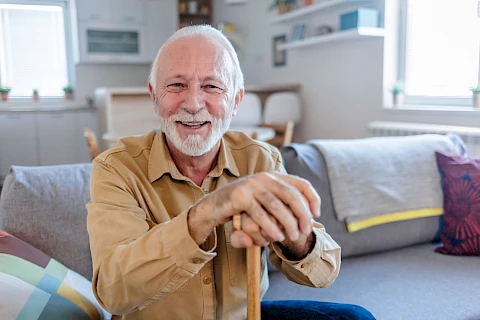
An osteoporosis diagnosis can be challenging, but it's an important opportunity for seniors and caregivers to take proactive steps to ensure better health outcomes. Osteoporosis, characterized by weakened bones, increases the risk of fractures and calls for key lifestyle adjustments to help manage this condition effectively. It's time to explore the critical lifestyle changes that can support bone health and reduce risk factors, providing valuable information for caregivers supporting their loved ones.
What Is Osteoporosis?
Osteoporosis is when bones become weak and fragile, leading to a higher likelihood of fractures, particularly in the hip, spine, and wrist. It often progresses without symptoms until a fracture occurs, making early diagnosis and proactive management crucial. As bone density decreases, everyday activities can lead to injuries, significantly affecting a senior's quality of life. Fortunately, lifestyle changes can play a significant role in managing osteoporosis and preventing complications.
Diet and Nutrition
Diet is a cornerstone in managing osteoporosis. Calcium and vitamin D are essential for bone health. Seniors should aim to include calcium-rich foods like dairy products, leafy greens, and fortified cereals in their diet. Vitamin D, which helps the body absorb calcium, can be sourced from fatty fish, fortified milk, and safe sun exposure. It's wise to limit caffeine and alcohol, which can hinder calcium absorption. Caregivers can support seniors by helping plan balanced meals or accompanying them on grocery shopping trips.
Exercise and Physical Activity
Regular physical activity strengthens bones and improves balance, reducing fall risk. Weight-bearing exercises like walking, dancing, or light aerobics boost bone density, while strength training builds muscle support around bones. Low-impact exercises such as tai chi or swimming enhance flexibility without straining joints. Caregivers can encourage safe participation in these activities by joining in or arranging group classes tailored to seniors. Always check with your senior loved one's doctor before trying new exercises.
Fall Prevention
Preventing falls is paramount for those with osteoporosis. Make their home senior-friendly with modifications like removing tripping hazards, adding grab bars, and improving lighting to significantly reduce fall risks. Regular vision and hearing checks are also essential, as sensory impairments can contribute to accidents. Caregivers can conduct home safety assessments and facilitate necessary changes to create a safer living environment.
Medication Management
Adhering to prescribed medication regimens is vital for managing osteoporosis. Medications can help strengthen bones and reduce fracture risk. Seniors must discuss medication options with healthcare providers, ensuring the chosen course aligns with their health needs and lifestyle. Caregivers can assist by organizing medications, setting reminders for doses, and attending medical appointments to stay informed about the latest treatments.
Role of Caregivers
A caregiver's role is central in implementing these lifestyle changes. Supporting dietary and exercise adjustments can enhance bone health and provide emotional encouragement and companionship. Assisting with home safety modifications ensures a secure environment, safeguarding against falls. Encouraging medication adherence and organizing health appointments helps maintain consistency in managing osteoporosis. By offering empathetic support, caregivers can alleviate the emotional and physical burdens of managing this condition.
Safe, Personalized Care for Stronger Living
Managing osteoporosis involves lifestyle changes focusing on nutrition, exercise, safety, and medication. These adjustments can greatly enhance a senior's quality of life and reduce the risk of fractures. Caregivers are instrumental in facilitating these changes and providing unwavering support.
Senior Helpers provides personalized care plans that support seniors in managing lifestyle changes after an osteoporosis diagnosis, including assistance with safe mobility, fall prevention, and daily activities. Their trained caregivers also help promote bone-healthy habits such as proper nutrition, medication reminders, and gentle exercise routines. If you or a loved one needs assistance, don't hesitate to reach out to Senior Helpers of Portage / Geauga. Whether you're in Aurora, Chagrin Falls, Chesterland, Hudson, or Ravenna, their team is ready to offer tailored support and guidance.